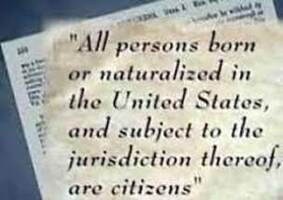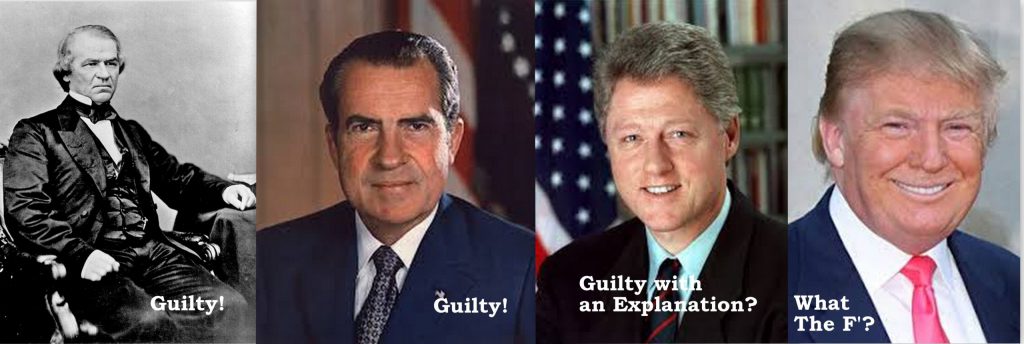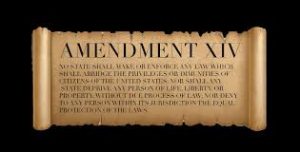

The Ever Changing Criteria for Impeachment
ELAND, WI – I don’t know if you noticed, but the criterion employed by the House of Representatives for impeaching a President has changed over the years, at least twice! Today, The House of Representatives is attempting to impeach President Trump reasons that are different from the reasons the House impeached President Clinton. In turn, President Clinton was impeached for reasons that were completely different from the reasons that the House attempted to impeach President Nixon and did, in fact, impeach President A. Johnson. Let’s look at the different criteria that have been, and are currently being, used as a basis for impeachment:
1. The “Original” Criterion (1788-1997) – This criterion was the one set out in the Constitution. In order to be impeached, a President’s actions had to constituted a “serious” crime, such as Treason, Bribery, or other (i.e. equally illegal and serious, but different in form) High Crime or Misdemeanor (TBOHCM). The President’s offense had to be a serious violation of a “serious” law, not a minor one, like failing to attend church.
This criterion was used to impeach President A. Johnson and in the attempt to impeach President Nixon (prior to his resignation). The improper actions committed by these two Presidents were different, but they were clearly serious violations of a “serious” law. No interpretations were necessary to prove illegality, only a finding that the actions were taken. Once the facts were proved, any tribunal would find (as one did in the case of A. Johnson and they would have in the case of Nixon) that both Presidents seriously violated a “serious” law and as such, had to be impeached.
2. The “New and Reduced” Criterion (1998-2017) – In the case of President Clinton, the TBOHCM bar was substantially lowered. Clinton was impeached for committing perjury. While the law proscribing perjury is a “serious” law and violating it is sometimes a serious legal breach (e.g. testifying under oath that you saw someone commit a murder when in fact, you did not), sometimes, perjury is not that serious (e.g. lying under oath by saying, “the accused was wearing a blue shirt” when the accused’s shirt color was not blue and the shirt’s color had nothing to do with the alleged crime). That was the case with Clinton. He, in fact, did violate a “serious” law, perjury (he later admitted it and lost his law license), but his particular violation of it, denying he had a consensual sexual relationship with a competent, adult, female, was not serious (in fact, an argument can be made that it was inconsequential). Clinton was being questioned under Oath about the affair not provide evidence of a crime, but merely to embarrass him, personally and politically. He was impeached for violating a “serious” law, but his violation was not that legally serious,
The bar was lowered by the then Republican controlled House solely to impeach President Clinton.
3. The “New and Reduced Criterion Requiring Interpretation” (2018 to Date) – This is the criterion that the Democrats are using to impeach President Trump. Unlike previous criteria, this criterion doesn’t require the clear breaking of a “serious” law. In fact, it doesn’t require the clear breaking of any law. This criterion only requires that a President perform an act that could, given some logical or political interpretations, be construed as a violation of a law, whether the law is “serious” or not. In the case of Trump, the House is alleging, that during a telephone conversation with newly elected of Ukraine, Trump indicated (he clearly did not say it, so some other indicia must be interpreted) as a violation of any (not necessarily a serious) law. The evidence is clear that President Trump, in a telephone conversation with President Zelensky casually asked Zelensky to investigate several wrongdoings, including whether former Vice-President Joe Biden and his son Hunter violated the U.S. (and probably Ukrainian) law. It is also undisputed that when Trump made the call former Vice-President Biden was running for the Democrat nomination for President. If he won the nomination, he would, presumably, face President Trump in the November 2020 general election.
These actions, by themselves, do not constitute a clear of prima facie violation of any law, serious or otherwise. A crime was committed only if Trump’s actions were logically and/or politically interpreted to show a violation of the law. For any illegality to be found, things such as frame of mine (of both Trump and Zelensky), intent and what prior knowledge Trump had of the funds being withheld, would, along with the facts, have to be thrown into the legal blender and proved.
In order for Trump to be guilty of anything except enforcing the law and showing off on behalf of the United States – which some of us think that is a good thing – it would have to be shown that, by applying the New and Reduced Criterion Requiring Interpretation, Trump did something illegal. The current theory being floated is that the illegality was Trump offering Zelensky an illegal Quid Pro Quo arrangement.
Like most Americans, you are probably asking, “What the heck is a Quid Pro Quo arrangement?” The definition is simple: A favor (the “Quid”) is offered by one party, only if (the “Pro”) an action will be taken by the other party (the “Quo”). It is alleged that Trump offered to give Ukraine military assistance (The “Quid”) only if (The “Pro”) several things, including an investigation of Joe Biden, were undertaken by Ukraine (The “Quos”).
Not all Quid Pro Quo agreements are illegal. In order for Trump’s particular Quid Pro Quo agreement (if, in fact, it was a Quid Pro Quo agreement) to be illegal, interpretation is required, which means that in addition to proving the facts of the case, they have to be interpreted. It must be shown (via logical and/or political interpretation) that Trump intended to obtain a personal (and political) benefit by having a political foe harmed and that both Trump and Zelensky were both aware that the withholding of the funds was possible and was threatened.
Only then would this Quid Pro Quo arrangement be criminal. All the other Quos casually mentioned by Trump (about cleaning up crime and investigating others) are perfectly legal (and a good idea). After all, American Presidents have been offering foreign countries Quid Pro Quo since our country was founded! After all, why does the world like us? Hint: We give them money (Quid) only if (Pro) they like us (Quo)!
To recap, the criterion being used by the House of Representatives to impeach President Trump doesn’t require a serious violation of a “serious” law, such as TBOHCM (i.e. The Original Criterion), nor does it require a minor violation of a “serious” law (i.e. The New and Reduced Criterion). Instead, “The New and Reduced Criterion Requiring Interpretation” is now being used. This criterion permits impeachment if the President merely took an action that, when logically and politically interpreted, could be construed as a violation of any law, “serious” or not.
The bar of TBOHCM was again lowered, this time by a Democrat controlled House, solely to impeach President Trump.
As you can see, today’s criterion for impeachment wouldn’t be recognized by our Founding Fathers. I wonder if the change will be good for America? Perhaps not! What if our next President was discovered to have made an illegal Quid Pro Quo arrangement with Ukraine that personally benefitted one of his family, say a son named Hunter. What criterion for impeachment should be used then?
Finally, recent news stories seem to imply that Quid Pro Quo arrangements are illegal or morally reprehensible. They’re not; just today I made a few:
- I promised to pay Bill $250 only if he fixed my car.
- I promised to pay the nice cashier at Publix $34.12, only if she allowed me to keep the groceries in my cart
- I promised Officer Sacco I would respect the police, only if he didn’t issue me a citation for making an illegal left turn
- I promised God that I would make an offering at church, only if he let me into heaven.
So far, they’ve
all worked out, except the last one, which is still pending.
Many commentators forget to include the word “Other” in the constitutional definition of impeachable offenses. They say that a President can be impeached if he merely commits Bribery, Treason, or any High Crime or Misdemeanor. Under this interpretation, The House of Representatives can define High Crime or Misdemeanor to be anything they want it to be! I think the word “other” should be considered because it relates a High Crime or Misdemeanor back to the seriousness of Bribery or Treason. Following my thinking, a High Crime or Misdemeanor must be a crime just as egregious as Bribery or Treason, not just what the House says it is.
Pronounced Tee-Bee-O-Aitch-Com (T-B-O-H-COM)
President A. Johnson – Clearly violated the Tenure of Office Act by firing Secretary of War Edwin Stanton. Although this law was later repealed (and, in a case concerning a similar law, was found “likely unconstitutional” by the U.S. Supreme Court), Johnson clearly violated the law while it was in effect. President Nixon – Clearly obstructed justice by withholding incriminating audio tapes and other evidence and by tampering with witnesses. His acts were a clear violation of the law.
At least I think this is what they are alleging; they are all over the place so it is hard to define the actual allegation.
One numerous interpretation made by some Democrats is that Trump was applying pressure as a Mafia Godfather would, not directly, but by inference. They say Trump was making Zelensky “an offer he couldn’t refuse”.
Ironically, by using U.S. Foreign Aid in a Quid Pro Quo transaction with Ukraine.
Sufficient, by itself, to establish a crime.
Which, along with Ipso Facto, are my favorite sounding Latin words.
Which means that anyone else who has committed international extortion can avoid prosecution by running for president as a Democrat (maybe that’s why so many of them are running)?
Examples of other legal Quid Pro Quo arrangements made by previous presidents: Andrew Jackson (and Martin Van Buren), Greetings Cherokee, Chickasaw, Choctaw, Muscogee, and Seminole tribes. We will let you live, only if you walk 800 miles from Georgia to Oklahoma without any food, water or shelter. FDR, “Gamarjoba, Uncle Joe, we will give you Eastern Europe, only if you join us in the war on Japan. JFK, Zdravstvujtye, Nik, we will we will remove our Thor and Jupiter missiles from Turkey only if you remove your missiles from Cuba. Obama, Salam, Hassan, will we give you 150 billion dollars ($500 from each and every person in the United States), only if you promise to be nice and not make atomic bombs or ballistic missiles.
masteradmin
LOOKING FOR SOMETHING?
MAKE A DONATION TO KEEP POLITICAL SATIRE ALIVE
No Donation Too Small . . .
No Donation Too Big.





